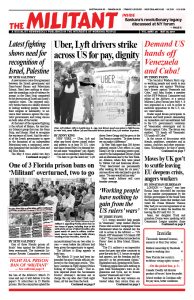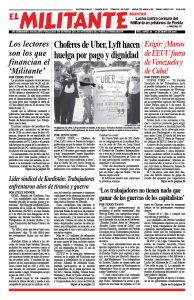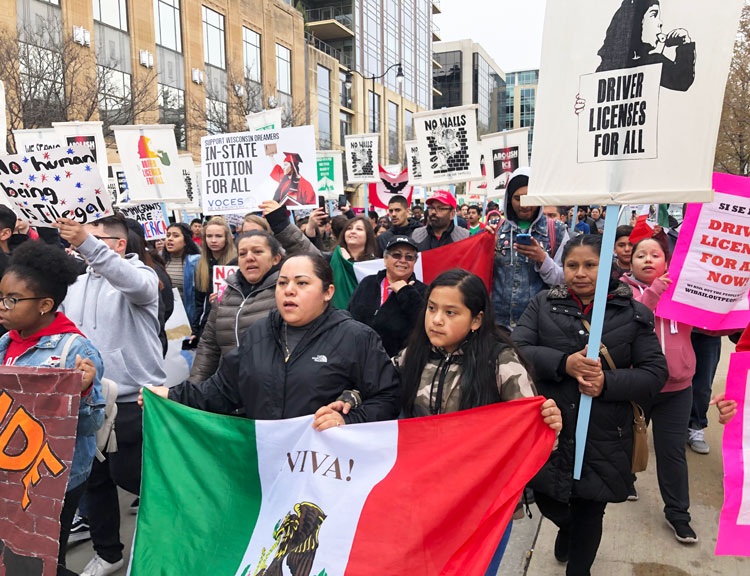Tens of thousands of workers in small towns, large cities and rural areas across the U.S. took to the streets for International Workers Day May 1 as the capitalist bosses and their government bear down on workers’ living and working conditions — immigrant and native-born. The main focus of many of the protests was the rights of undocumented workers, and that they have access to a driver’s license.
“Immigrant workers need driver’s licenses for the same reason as everyone else,” factory worker Santos Ramos told the Militant at a May Day rally of 4,000 in Madison, Wisconsin, “to get to work and to do the shopping. Demonstrations like today will help win them.”
In Wisconsin, immigrants had been able to get driver’s licenses regardless of their legal status until 2007, when a law requiring a Social Security number to get a license went into effect. “I want to be able to drive without fear. Sometimes the police stop us just for being Hispanic, even if there’s no infraction,” said Gonzalo Hernández, a Mexican-born restaurant worker who came to the protest from Milwaukee. “And I’m also here because we need amnesty.”
Uniting the whole working class
“Amnesty now!” for the 11 million undocumented workers in the U.S. — a demand in the interests of all working people — is a necessary step toward uniting the whole working class. “It’s in the interests of working people to fight for amnesty for all undocumented immigrants in the U.S.,” said a campaign flyer distributed by Seth Galinsky, Socialist Workers Party candidate for New York City public advocate. He joined a May 1 rally in Perth Amboy, New Jersey.
“The capitalists depend on this pool of superexploited workers to better compete against their rivals around the world,” Galinsky said. “They try to pit us against each other, to bring down the wages and working conditions of all.”
The Perth Amboy demonstration of 250 included construction, restaurant and factory workers and small-business owners. In New Jersey the maximum fine for driving without a license is $500. But as in other states that deny licenses to immigrants without “proper papers,” those that do drive run the risk the cops will turn them over to immigration authorities.
In Elkhart, Indiana, 70 people rallied in the parking lot of Cueramaro Supermarket and marched downtown chanting “Licensia, si! Promesas, no!” (Licenses, yes. Promises, no.) There were 900 documented stops by cops of drivers without licenses in Elkhart County in 2018 and 361 people, mostly Hispanic, were arrested and jailed.
Marchers talked to the Militant about a victory there last year preventing the building of an immigration detention center. “A detention center didn’t open last year because people in the town of Elkhart did not want to see people incarcerated,” said Jesus Huizar, a 25-year-old factory worker participating in his first May Day demonstration. “Really, it’s not a ‘detention,’ it’s incarceration, another prison.”
In Detroit, 250 workers, majority Latino, assembled downtown to march to southwest Detroit behind a banner saying “El grito por licencias” (the cry for driver’s licenses.) By the time the march arrived in Clark Park, there were more than 800 people.
‘We are here, we will not leave’
At an event sponsored by Immigrant Dignity in Athens, Georgia, 60 people marched and rallied, chanting “Aqui estamos, no nos vamos.” (We are here, we will not leave.)
Organizer Beto Hernandez told marchers that on April 13, the Clark County government there promised to stop arresting undocumented workers who are unable to get driver’s licenses. “We will continue to organize to make sure that this promise is carried out,” he said.
Construction workers, domestic workers and day laborers, many originally from Central America, were among the 40 protesters in Mineola, New York, who marched to Hempstead for an evening forum. Speakers called on state legislators to pass a bill providing driver’s license for all. The protest also demanded legal residence for all undocumented workers. Sponsors included the National Day Laborer Organizing Network and Workplace Project.
Similar actions took place across the country.
There were also International Workers Day rallies in North and South Carolina attended by thousands of teachers and other school workers demanding their state governments provide more money for schools.
From San Juan, Puerto Rico — where some 2,000 people marched against government austerity measures and called for the speedup of hurricane recovery efforts — to Manila, Philippines, where workers demanded a raise in the minimum wage, protests were organized worldwide. In Seoul, South Korea, workers demanded equal pay for temporary workers; in Dhaka, Bangladesh, demands included reinstatement of fired workers and paid maternity leave for garment workers. Thousands of protesters marched to the national palace in Jakarta, Indonesia, to demand higher wages.
Riot police attacked workers’ marches in Turkey, Italy, Russia and in France, where the yellow vests have been protesting for months.
Laura Anderson and Naomi Craine from Chicago; Rachele Fruit from Atlanta; Robert Kissinger from Detroit; Martín Koppel from New York; and Ron Richards from Puerto Rico contributed to this article.


